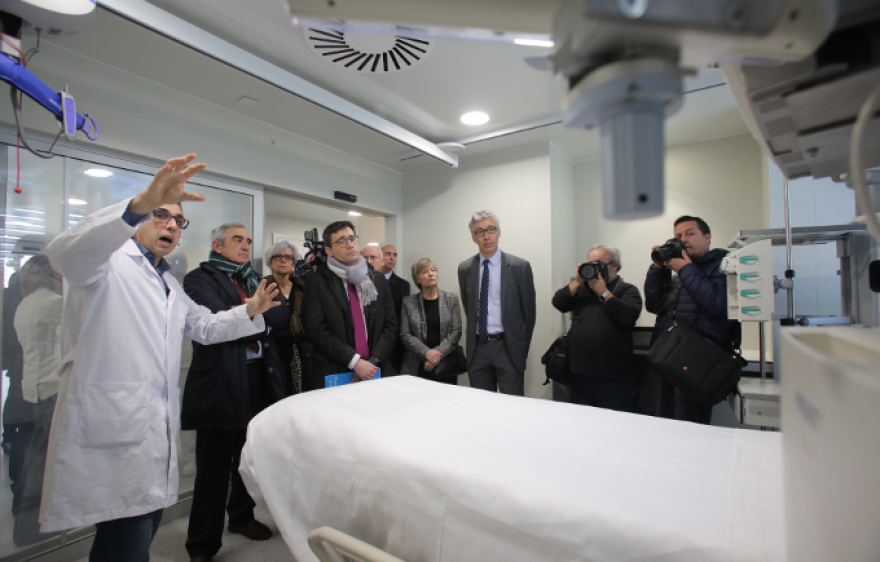It will improve the care patients receive, with greater privacy and comfort for them and their families
The action involved an investment of 1.5 million euros and the work of adaptation and remodeling have lasted for 7 months
News
The new Intensive Care Unit of the Mútua Terrassa University Hospital comes into operation

The director of the Catalan Health Service (CatSalut), David Elvira, today inaugurated the Intensive Care Unit of the MútuaTerrassa University Hospital. The new ICU, which depends on the Intensive Care Service, has been designed to allow a paradigm shift in patient care, adapting to their needs and those of their families.
This new unit is organized with the aim of improving the privacy, well-being and comfort of patients and relatives, taking into account that the critical patient is especially vulnerable and needs a comfortable and humane care. In addition to the technological improvements that facilitate improving the recovery capacity and survival of patients, the human aspect is key in the care of patients who are in the ICU.
In this sense, the schedule of access to the ICU by the family members is made more flexible and extended, and continuous accompaniment is facilitated, with greater privacy and without space pressures.
Likewise, the new ICU improves the working conditions of the professionals, who will be able to carry out their assistance task in more functional spaces, with natural light and better circulation.
Jordi Parera, president of MútuaTerrassa, has put in value that the new UCI has allowed a paradigm shift in patient care as it focuses the focus on him and his family, in addition to having a technical equipment of the highest level. In this sense, the director of CatSalut, David Elvira, said that there is more and more scientific evidence that a more human care and closer proximity of family members is essential for the survival and recovery of the most critical patients, in addition to highlighting the benefit that will mean the environmental space of the unit by the professionals who work. For his part, Alfredo Vega, mayor of Terrassa, said that the inauguration of today is a commitment to incorporate new technologies at the service of people. "In addition to providing an excellent sanitary quality, many improvements have been present for patients and therefore we are satisfied with this commitment of city and country," Vega concluded.
The new ICU, located on the 4th floor of the MútuaTerrassa University Hospital (HUMT), increases the number of beds from 12 to 14 and offers the possibility of treating up to 20 patients in exceptional situations. The distribution of the space has been made in accordance with optimization criteria and according to the requirements of patient care. In this way, the space is divided into two differentiated units.
An account with 8 boxes of 14 m2, which have the most advanced technical equipment: overpressure to prevent entry of outside air, closing with automatic doors and electropolaritzats crystals, cranes on the roof for patient mobilization, conductive soil, etc. In addition, it is located in a central place in the unit where professionals have direct vision to almost all of the boxes.
The other has been designed more similar to a hospitalization facility. It has 6 rooms of 20 m2 designed for a single patient. In addition, it has two adapted rooms that allow the isolation of patients in cases of transmissible infectious diseases.
The works that have made it possible to have the new facilities of the UCI began at the end of June last year and have involved an investment of 1.5 million euros. In these 7 months, the reform of the 4th floor has been complete: it has an area of 955 m2 and the action has been carried out on 80% of the plant (equivalent to 765 m2). A complete revision and structural and safety update has been carried out, with the isolation of the facades and the renovation of all the facilities.
The Service of Intensive Medicine
The work of the Intensive Medicine Service (SMI) of HUMT focuses on the care of critical patients, that is, those who are in situations of immediate or possible life risk, and who have a reversible clinical situation. As a consequence of these particularities, the operation of the SMI requires attention 24 hours a day, every day of the year.
It is a multidisciplinary service that integrates different professional areas under the responsibility of both the Intensive Care Unit (ICU) and the semi-intensive (or Semicritical) Unit. Last year, the SMI paid attention to a total of 1,783 patients and admitted a total of 745 patients to the ICU.